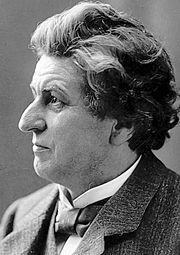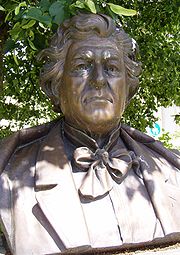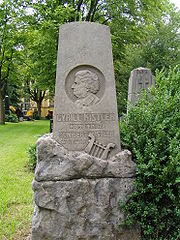
Cyrill Kistler
Encyclopedia



Composer
A composer is a person who creates music, either by musical notation or oral tradition, for interpretation and performance, or through direct manipulation of sonic material through electronic media...
, music theoretician
Music theory
Music theory is the study of how music works. It examines the language and notation of music. It seeks to identify patterns and structures in composers' techniques across or within genres, styles, or historical periods...
, Music educator
Music education
Music education is a field of study associated with the teaching and learning of music. It touches on all domains of learning, including the psychomotor domain , the cognitive domain , and, in particular and significant ways,the affective domain, including music appreciation and sensitivity...
and Music publisher
Publishing
Publishing is the process of production and dissemination of literature or information—the activity of making information available to the general public...
.
Life
Born into a Swabian family of craftsmen, Kistler attended the Lehrerseminar (Teacher seminar) in Lauingen (Swabia) from 1864 to 1867. Subsequently, he firstly worked as a teacher at various places in Middle Swabia. However, when he was no longer content with this way of making a living, he, instead, concentrated merely on making and composing music. From 1876 to 1878, he was a student at the Königliche Musikschule (Royal Music School) in Munich in the subjects organ and composition; one of his teachers was Josef RheinbergerJosef Rheinberger
Josef Gabriel Rheinberger was a German organist and composer, born in Liechtenstein.-Short biography:...
. Afterwards, in 1883, he took over the position of a teacher for Music theory
Music theory
Music theory is the study of how music works. It examines the language and notation of music. It seeks to identify patterns and structures in composers' techniques across or within genres, styles, or historical periods...
at the Fürstliches Konservatorium (Baronial Academy of Music) at Sondershausen
Sondershausen
Sondershausen is a town in Thuringia, Germany, capital of the Kyffhäuserkreis district, situated about 50 km north of Erfurt. On 1 December 2007, the former municipality Schernberg was incorporated by Sondershausen....
. In 1876, he got to know Richard Wagner
Richard Wagner
Wilhelm Richard Wagner was a German composer, conductor, theatre director, philosopher, music theorist, poet, essayist and writer primarily known for his operas...
at Bayreuth, whose work exerted a deep influence on Kistler.
From 1884 on, he worked at Bad Kissingen in Lower Franconia, where he founded an own music school. From 1880 on, he published the music journal „Musikalische Tagesfragen. Organ für Musiker, Musikfreunde und Freunde der Wahrheit“ („Current questions on music. An organ for musicians, friends of music and friends of truth“). The journal existed for a period of 12 years, with periods of interruptions due to Kistler's health problems in between. Kistler composed operas (for instance „Baldurs Tod“, „Die Kleinstädter“, „Kunihild“, „Der Schmied von Kochel“ und „Eulenspiegel“), secular and clerical choral works, songs, and pieces for organ and piano. In 1904, Kistler published his harmonics „Der einfache Kontrapunkt und die einfache Fuge“ („The Simple Counterpoint and the Simple Fugue“).
In his lifetime, Kistler became very well known through his work and by writing more than 200 works. He was placed on a par with Richard Strauss
Richard Strauss
Richard Georg Strauss was a leading German composer of the late Romantic and early modern eras. He is known for his operas, which include Der Rosenkavalier and Salome; his Lieder, especially his Four Last Songs; and his tone poems and orchestral works, such as Death and Transfiguration, Till...
and, in a certain way, was in competition with him. When Kistler premiered his opera „Eulenspiegel“ at Würzburg
Würzburg
Würzburg is a city in the region of Franconia which lies in the northern tip of Bavaria, Germany. Located at the Main River, it is the capital of the Regierungsbezirk Lower Franconia. The regional dialect is Franconian....
in 1889, Richard Strauss, though, regarded the libretto of the opera to be „clumsy“ and „amusing“. Instead, he used the opera as an opportunity to write his own Symphonic poem
Symphonic poem
A symphonic poem or tone poem is a piece of orchestral music in a single continuous section in which the content of a poem, a story or novel, a painting, a landscape or another source is illustrated or evoked. The term was first applied by Hungarian composer Franz Liszt to his 13 works in this vein...
„Till Eulenspiegel's Merry Pranks“ a few years later, which had far more success.
Richard Wagner
Richard Wagner
Wilhelm Richard Wagner was a German composer, conductor, theatre director, philosopher, music theorist, poet, essayist and writer primarily known for his operas...
described his friend Cyrill Kistler as his only dignified successor. Kistler's former teacher Josef Rheinberger dedicated his work „De profundis“, which he had written on April 22, 1881, to his former student Kistler with the handwritten dedication on it: „Herrn Cyrill Kistler zu freundl. Erinnerung. München 16.5.1896. J. Rh.“ („To Mr. Cyrill Kistler on a friendly memory. Munich, May 16th 1896, J. Rh.“).
However, Kistlers music is nowadays sunk into oblivion to a great extend. His grave on the Bad Kissingen Kapellenfriedhof (Chapel Cemetery) is unnoticed.
Among his students was the pianist Mieczysław Horszowski, who was once described as Polish „child prodigy“.
Works (Excerpt)
- Musiktheoretische Schriften, 2. Auflage, Verlag C.F. Schmidt, Heilbronn 1898-1904.
- Band 1: Harmonielehre.
- Band 2: Der einfache Kontrapunkt. Der Dreisatz und Zweisatz. Die einfache Fuge. (System Rheinberger-Kistler.)
- Band 3: Der doppelte Kontrapunkt, die Doppelfuge, die dreistimmige und zweistimmige Fuge.
- Band 4: Der drei-, vier- und fünfstimmige Kontrapunkt. Höchste Kunst der Polyphonie. Die Fuge zu drei, vier und fünf Stimmen.
- Die Hexenküche (Symphonic poem based on Goethe's FaustGoethe's FaustJohann Wolfgang von Goethe's Faust is a tragic play in two parts: and . Although written as a closet drama, it is the play with the largest audience numbers on German-language stages...
) op. 130 - Festmarsch für großes Orchester op. 41
Tributes
In Bad Kissingen as well as in Großaitingen, streets named after Cyrill Kistler are to be found. In Großaitingen, there is a memorial stone opposite to the house of his birth.Literature
- Gerhard Wulz: Der Kapellenfriedhof in Bad Kissingen. Ein Führer mit Kurzbiografien, Bad Kissingen 2001, ISBN 3-934912-04-4
- Hanns-Helmut Schnebel: Cyrill Kistler - Tondichter und Pädagoge; in: „Bayerische Blasmusik“ 49,6 (1998), VII
- Peter Ziegler: Der Komponist der „Rhönklänge“ Cyrill Kistler. In: „Rhön-Spiegel“, Band 24 (2007), Heft 1
- Cyrill Kistler, Nachruf. In: „The Musical Times“, Band 48, Nr. 768 vom 1. Februar 1907), Seite 111
External links
- Cyrill-Kistler
- Literaturliste im Online-Katalog der Staatsbibliothek zu Berlin
- Peter Weidisch: Cyrill Kistler- Sein Leben. Komponist, Musikpädagoge, Verleger
- Werkverzeichnis (Auswahl)
- Kistler-Biografie in: „Volksmusik in Bayern“ 24 (2007), Heft 1
- Leseprobe aus dem Buch von Winfried Zimmermann: Cyrill Kistler, Gemeinde Großaitingen (Hrsg.), 2007, zum 100. Todestag

